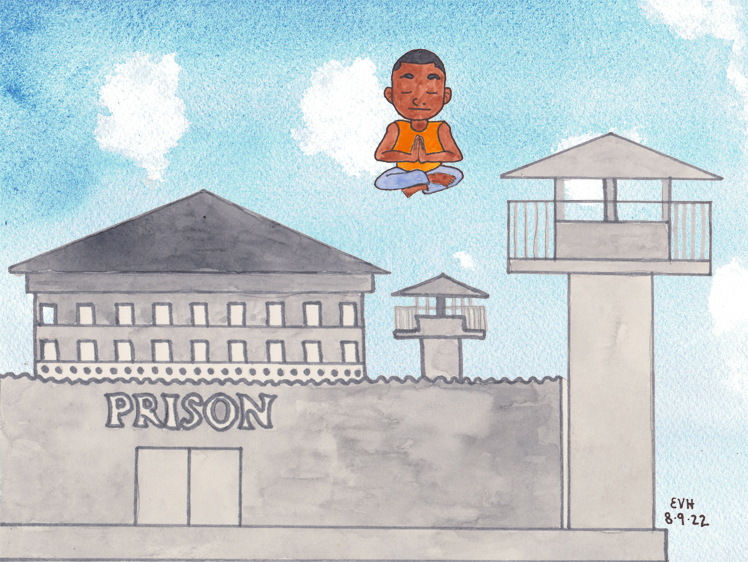
Jataka 355
Ghata Jātaka
Prince Ghata
as told by Eric Van Horn
originally translated by H.T. Francis and R.A. Neil, Cambridge University
originally edited by Professor Edward Byles Cowell, Cambridge University
This is a story about how good can come from evil or misfortune. In modern times, Mahatma Gandhi, Martin Luther King, Jr., and Nelson Mandela all talked about how their time in prison was instrumental in their growth as people. It gave them the time for deep contemplation and reflection. Ajahn Brahm has a book called “Good? Bad? Who Knows?” about just this phenomenon. You just never know what the final outcome may be from events that initially seem quite distressful. This happened quite profoundly in my own life. The worst time in my life also turned out to have the best possible outcome.
“While others weep.” The Master told this story when he was at Jetavana. It is about a minister of the King of Kosala. The introductory story is identical with one already given (Jātaka 351). But in this case the King—after bestowing great honor on a minister who had served him well—listened to some mischief-makers. He had him seized and thrown into prison. While the minister was there, he attained the first stage of enlightenment, stream-entry. The King became aware of his great merit and released him.
The minister took a scented garland and went to see the Master. He saluted him and sat down. Then the Master asked if some evil had befallen him. “Yes, reverend sir,” he answered, "but through evil, good has come to me. I have entered the stream.” Truly,” said the Master, “not you only, but sages of old got good out of evil.” And at his request he told him a story from the past.
Once upon a time when Brahmadatta was reigning in Benares, the Bodhisatta was born to him as the son of his Queen-consort. They called him “Prince Ghata.” Subsequently he mastered the arts at Takkasilā University and came to rule his kingdom righteously.
Now a certain minister was guilty of misconduct in the royal harem. The King, after witnessing the offence with his own eyes, banished him from his kingdom.
At that time a King named “Vaṅka” ruled in Sāvatthi. The minister went to him and entered into his service, just as in the former story (Jātaka 303) He gained the King’s ear and got him to attack the kingdom of Benares. After gaining possession of the kingdom, he had the Bodhisatta bound in chains and throw into prison.
But the Bodhisatta entered into deep meditation and sat cross-legged in the air. A burning heat sprang up in the body of Vaṅka. He went and saw the countenance of the Bodhisatta radiant with the beauty of a full-blown lotus, like a golden mirror. And in the form of a question, he stated the first stanza:
While others weep and wail,
Their cheeks with tears bestained,
Why still with smiling face,
has Ghata ne’er complained?

Figure: The radiant prisoner
Then the Bodhisatta, to explain why he did not grieve, recited the remaining stanzas:
To change the past all sorrow is but vain,
It has no blessing for a future state.
Why should I, Vaṅka, of my woes complain?
Grief is no profit fit with us to mate.
One that is sick with sorrow pines away,
His food insipid and distasteful grows,
Pierced as with arrows, to his grief a prey,
He sinks a laughing-stock to all his foes.
Whether my home be on dry land or sea,
Be it in village, or some forest drear,
No sorrow ever shall come near to me,
A soul converted has nothing to fear.
But he that lacks completion in himself
And is with lust of things of sense afire,
Not the whole world, with all its sordid wealth,
Can e’er suffice for such a man’s desire.
Vaṅka, after hearing these four stanzas, asked forgiveness of the Bodhisatta. He restored him to his kingdom and went on his way. But the Bodhisatta handed over the kingdom to his ministers. He retreated to the Himālayas and became a holy man. And without any break in his deep meditation, he was destined to be reborn in the world of Brahma.
The Master, having ended his lesson, identified the birth: “At that time Ananda was King Vaṅka, and I was King Ghata.”
